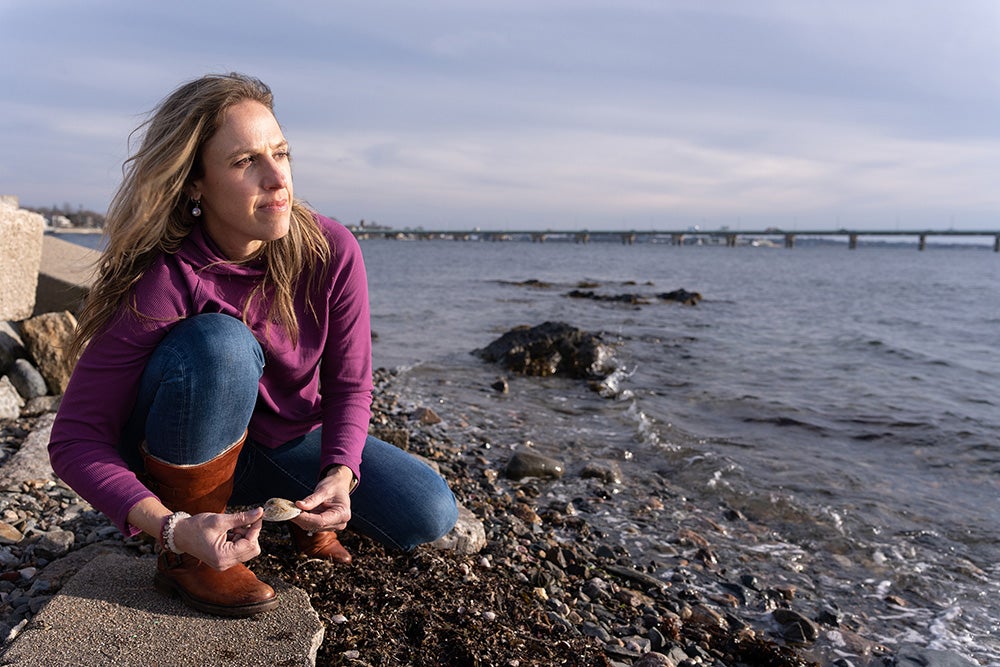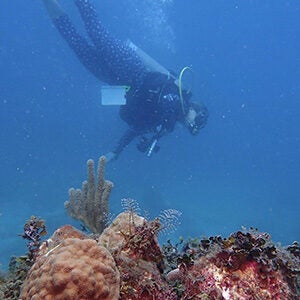
By Veronica M. Berounsky, Ph.D. ’90
A loud boom reverberated back to shore on April 18, 2006. Explosives placed along the old Jamestown Bridge, which had connected Conanicut Island to North Kingstown for 66 years, were detonated and the span collapsed into the West Passage of Narragansett Bay. To many it was a historic and exciting spectacle, but for GSO graduate student Natasha Pinckard Dickenson, M.S. ’10, it signaled the beginning of an unmatched opportunity to study the organisms and habitats that would develop on the two new underwater reefs made from the fallen bridge structure.
It wasn’t an easy undertaking. Dickenson was also working full time on benthic studies for the environmental consulting company Science Applications International Corporation (SAIC) in Newport, R.I., not to mention helping the R.I. Department of Environmental Management with field work. But her experience in these positions gave her the knowledge, skills and connections to be able to pull together a team of expert scientists, despite not having much funding for the work.
Not a typical path
“My time at GSO was nontraditional since I was not on campus much due to my full time job,” said Dickenson. “GSO Professor Jeremy Collie was my major professor. Christopher Deacutis [M.S.’77, Ph.D. ’82] at SAIC helped me out a lot. I worked closely with GSO Professor Candace Oviatt [Ph.D. ’67] who served as a great mentor for me. She was key to my grad school experience because she helped me design independent projects that focused on what I wanted to work on.”
Dickenson’s academic and professional studies culminated with her thesis, “Benthic recolonization and ecological succession at Rhode Island Sound artificial reefs.”
“Natasha was fearless and innovative,” said Oviatt. “She did a thorough job on her independent project, and it was useful even after she had left, to be able to look up information about the bottom community.”
Dickenson took a circuitous route to her thesis. Growing up in Rhode Island, she loved watching Jacques Cousteau on television with her father, who was an avid scuba diver. She learned to scuba dive at 19 so she could see the underwater world for herself.
Dickenson’s undergraduate studies first took her to two places out of state. When she realized that she wanted to specialize in the marine environment she came to the University of Rhode Island which had all the resources she needed, including an internship opportunity at Mystic Marine Aquarium working with marine mammals.
Dickenson graduated from URI in 1997 with a bachelor’s in biology. But instead of pursuing research, she spent the next few years crewing on 12-meter sailboats in Newport, R.I., sailing and scuba diving in tropical locations, and skiing out west. “I needed a little breather after undergrad but eventually it was time to get a job in my field,” Dickenson said. She soon found an opportunity as a biologist at SAIC working on benthic surveys, which she found so fascinating it became the focus of her master’s thesis.
A career with the Navy emerges
As Dickenson was finishing her thesis research in 2007, another opportunity arose: a job as a civilian marine scientist in the Mission Environmental Planning Program (MEPP) within the Naval Undersea Warfare Center (NUWC) Division in Newport.
“I’ve continued to work on benthic studies as I did for SAIC, but now I’m also supporting environmental compliance analysis and documentation for the Navy,” she said. “I’m also writing proposals, particularly for research to fill data gaps topics such as coral monitoring and biofouling, which will help guide future discussions of these types of ecosystems. And a benefit of working for the Navy is that those proposals are often funded by the Department of Defense, ultimately supporting the Navy’s mission. It’s been really great.”
So how did someone who likes to scuba dive and do benthic field work find happiness working for the U.S. Navy?
“Although to some it is difficult to fully understand what NUWC is and what they do, once you are part of it, you find there’s many opportunities for a lot of different backgrounds,” Dickenson said. “What I like about working for NUWC is that the research is not done in a bubble but is part of a bigger picture often spanning other Navy commands and fields. We strive to use the best available science in all our documents. It’s a full circle experience: you do the research, you write the reports, you find ways for the Navy to advance their mission without harming marine life. The Navy is not only a good steward of the environment, but they have to comply with laws and regulations, so the work has to be done properly. And there is so much to learn.”
“Don’t look for your dream job right away, you’ll find your niche along the way.”Natasha Dickenson, M.S. ’10
A variety of research opportunities
The research topics explored at NUWC are common to many scientific institutions. Climate change, for example, is an issue that the Navy is very much interested in because it has many facilities at risk from sea level rise. As Dickenson said, “Climate change is part of everyday life at NUWC in Newport.”
Coral monitoring, one of Dickenson’s specialties, is, as she noted, “crucial to our work because the Navy often needs to build piers and other structures near coral reefs. We make sure the work they are doing limits impacts to marine resources.”

Although she is not a Navy-certified diver, Dickenson is allowed to dive recreationally and view the work at certain Navy sites, such as coral reefs in Guantánamo Bay in Cuba, after the Navy dive work is done.
While Dickenson’s thesis work at GSO was focused on “beneficial biofouling,” another name for artificial reef colonization, the Navy calls on her expertise in “destructive biofouling.” She works on large-scale projects, such as methods to reduce biofouling on the hulls of decommissioned aircraft carriers. In Newport, she carries out biofouling testing in Stillwater Basin, located along the waterfront of the NUWC campus.
Dickenson noted the importance that the Navy places on sharing its research. “The Navy encourages you to have your results published in peer-reviewed scientific journals and to keep up with the scientific literature. And attendances at conferences is seen as an opportunity to interact and collaborate with non-Navy colleagues.”
Dickenson has remained at NUWC because, as she said, “It’s super exciting and fulfilling, and I’m happy where I am when I am in the office or in the field.”
Dickenson has advice for GSO students: “Don’t look for your dream job right away, you’ll find your niche along the way. I never expected to be working for the Navy, but the NUWC has been a great fit for me.”
